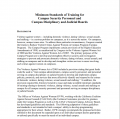Discipline at institutions of higher education (IHEs) refers to the policies, procedures, and strategies applied on campus to manage college student behavior and practices used to encourage self-discipline.
Campus disciplinary procedures address campus-wide, classroom, and individual college student needs through broad prevention, targeted intervention, and development of self-discipline. Approaches to campus discipline range from restorative (e.g., campus-wide school climate improvements, use of restorative practices) to punitive (e.g., probation, community service, restricted housing, expulsion). How campus disciplinary procedures are handled has a great impact on the IHE’s learning environment.
Students who have been suspended are significantly more likely to drop out of school and become involved in the justice system than their peers. Students of color, especially young men, and students with disabilities are disproportionately punished. IHEs that approach campus discipline punitively affect the overall campus climate, creating a more negative environment for all students, including those without discipline issues.
Establishing and maintaining a positive campus climate allows an IHE to proactively prevent disciplinary issues by increasing the strength and the quality of college students’ activities in and out of the classroom. This approach provides the essential conditions for nurturing, support, clear expectations, and guidance that foster healthy student development and motivation. Additionally, cultivating a sense of belonging can reduce disciplinary issues. Students feel emotionally and physically safer at IHEs that have a fair campus disciplinary structure, which has been linked with reductions in depressive symptoms, anxiety, and conduct problems.
A positive approach to disciplinary procedures shifts the focus of discipline from punitive to restorative of relationships and the understandings of and commitment to building a safe and supportive campus environment. The purpose of discipline then becomes the teaching of civility and interpersonal skills and the reconnection of alienated students. Preventive methods and multi-tiered models can provide pre-planned responses to disruption/violence, laying the foundation for positive discipline methods to be successful in creating a safe campus and the appropriate conditions for faculty to instruct effectively and for students to learn.
American Academy of Pediatrics. (1998). Guidance for effective discipline. Pediatrics, 101, 723–728.
Dishion, T. J., & Dodge, K. A. (2005). Peer contagion in interventions for children and adolescents: Moving towards an understanding of the ecology and dynamics of change. Journal of Abnormal Psychology, 33, 395–400.
Fabelo, T., Thompson, M. D., Plotkin, M., Carmichael, D., Marchbanks, M. P., & Booth, E. A. (2011). Breaking Schools' Rules: A Statewide Study of How School Discipline Relates to Students' Success and Juvenile Justice Involvement. Lexington, KY: Council of State Governments; College Station, TX: Public Policy Research Institute.
Gee, K. A., Haghighat, M. D., Vang, T. M., & Cooc, N. (2021). In the Aftermath of School Victimization: Links Between Authoritative School Climate and Adolescents’ Perceptions of the Negative Effects of Bullying Victimization. Journal of youth and adolescence, 1-14.
Gottfredson, G., Gottfredson, D., Payne, A., & Gottfredson, N. (2005). School climate predictors of school disorder: Results from a national study of delinquency prevention in schools. Journal of Research in Crime and Delinquency, 42, 412–444.
Goyer, J. P., Cohen, G. L., Cook, J. E., Master, A., Apfel, N., Lee, W., Henderson, A. G., Reeves, S. L., Okonofua, J. A., & Walton, G. M. (2019).
Targeted identity-safety interventions cause lasting reductions in discipline citations among negatively stereotyped boys. Journal of Personality and Social Psychology.
Gregory, A., Skiba, R. J., & Noguera, P. A. (2010). The achievement gap and the discipline gap: Two sides of the same coin? Educational Researcher, 39, 59–68.
Losen, D. J., & Whitaker, A. (2011). Million days lost: Race, discipline, and safety at US public schools (Part 1). Center for Civil Rights Remedies of UCLA’s Civil Rights Project and the American Civil Liberties Union of Southern California.
Mayer, G. R. (1995). Preventing antisocial behavior in the schools. Journal of Applied Behavior Analysis, 28, 467–478.
Mayer, G. R., & Butterworth, T. (1995). A preventive approach to school violence and vandalism: An experimental study. Personnel and Guidance Journal, 57(9), 436–441.
Morrison, G. M., Anthony, S., Storino, M. H., Cheng, J., Furlong, M. J., & Morrison, R. L. (2001). School expulsion as a process and an event: Before and after effects on children at-risk for school discipline. In R. Skiba & G. Noam (Eds.), New directions for youth development (pp. 45–71). San Francisco: Jossey-Bass.
Osher, D., Bear, G., Sprague, J., & Doyle, W. (2010). How we can improve school discipline. Educational Researcher, 39(1), 48-58.
Skiba, R., & Horner, R. (2011). Race is not neutral: A National investigation of African American and Latino disproportionality in school discipline. School Psychology Review, 40, 85-107.
Skiba, R. J., Michael, R., Nardo, A., & Peterson, R. (2000). The color of discipline: Gender and racial disparities in school punishment. Bloomington: Indiana Education Policy Center.
Skiba, R. J., Peterson, R. L., & Williams, T. (1997). Office referrals and suspension: Disciplinary intervention in middle schools. Education and Treatment of Children, 20, 1–21.
US Department of Education (ED). (2016, July 11). School Climate and Discipline: Know the Data. Laws & Guidance. https://www2.ed.gov/policy/gen/guid/school-discipline/data.htm
Wachtel, T., (2016) Defining Restorative. International Institute for Restorative Practices. https://www.iirp.edu/defining-restorative/social-discipline-window

